TextRank 是一种基于 PageRank 的算法,常用于关键词提取和文本摘要。在本文中,我将通过一个关键字提取示例帮助您了解 TextRank 如何工作,并展示 Python 的实现。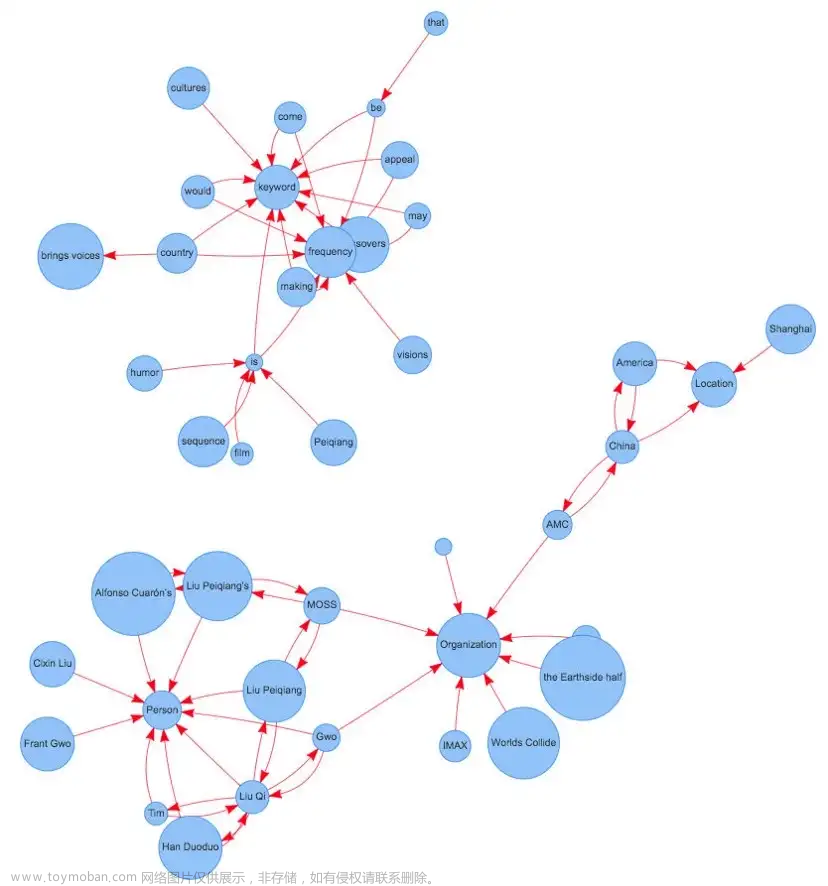
1.PageRank 简介
关于 PageRank 的文章有很多,我只简单介绍一下 PageRank。这将有助于我们稍后理解 TextRank,因为它是基于 PageRank 的。
PageRank (PR) 是一种用于计算网页权重的算法。我们可以把所有的网页看成一个大的有向图。在此图中,节点是网页。如果网页 A 有指向网页 B 的链接,则它可以表示为从 A 到 B 的有向边。
构建完整个图后,我们可以通过以下公式为网页分配权重。

这是一个示例,可以更好地理解上面的符号。我们有一个图表来表示网页如何相互链接。每个节点代表一个网页,箭头代表边。我们想得到网页 e 的权重。
我们可以将上述函数中的求和部分重写为更简单的版本。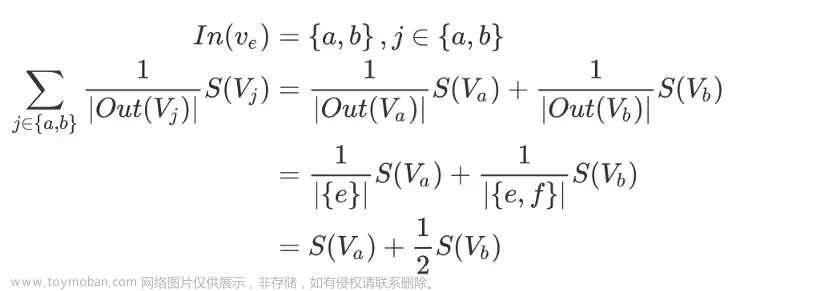
我们可以通过下面的函数得到网页 e 的权重。
我们可以看到网页 e 的权重取决于其入站页面的权重。我们需要多次运行此迭代才能获得最终权重。初始化时,每个网页的重要性为 1。
2.PageRank 实现

我们可以用一个矩阵来表示图中 a、b、e、f 之间的入站和出站链接。
一行中的每个节点表示来自其他节点的入站链接。例如,对于 e 行,节点 a 和 b 具有指向节点 e 的出站链接。本演示文稿将简化更新权重的计算。
根据
1
∣
O
u
t
(
V
i
)
∣
\frac{1}{|Out(Vi)|}
∣Out(Vi)∣1,从函数中,我们应该规范化每一列。
我们使用这个矩阵乘以所有节点的权重。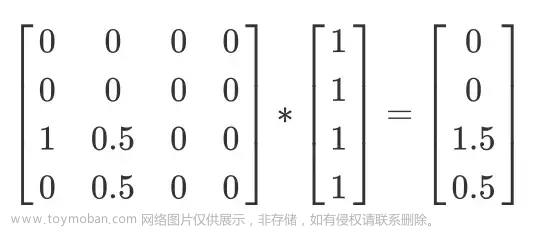
这只是一次没有阻尼系数 d 的迭代。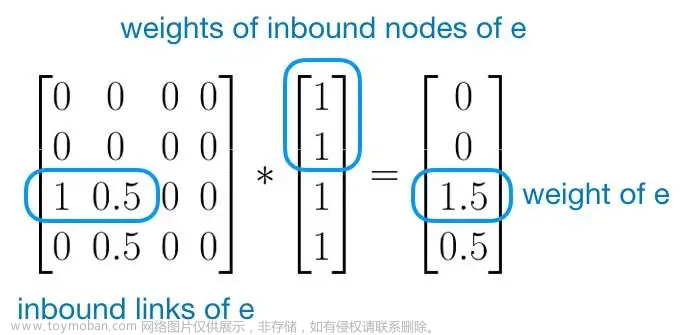
我们可以使用 Python 进行多次迭代。
import numpy as np
g = [[0, 0, 0, 0],
[0, 0, 0, 0],
[1, 0.5, 0, 0],
[0, 0.5, 0, 0]]
g = np.array(g)
pr = np.array([1, 1, 1, 1]) # initialization for a, b, e, f is 1
d = 0.85
for iter in range(10):
pr = 0.15 + 0.85 * np.dot(g, pr)
print(iter)
print(pr)
0
[0.15 0.15 1.425 0.575]
1
[0.15 0.15 0.34125 0.21375]
2
[0.15 0.15 0.34125 0.21375]
3
[0.15 0.15 0.34125 0.21375]
4
[0.15 0.15 0.34125 0.21375]
5
[0.15 0.15 0.34125 0.21375]
6
[0.15 0.15 0.34125 0.21375]
7
[0.15 0.15 0.34125 0.21375]
8
[0.15 0.15 0.34125 0.21375]
9
[0.15 0.15 0.34125 0.21375]
10
[0.15 0.15 0.34125 0.21375]
所以 e 的权重(PageRank值)为 0.34125。
如果我们把有向边变成无向边,我们就可以相应地改变矩阵。
规范化。

我们应该相应地更改代码。
import numpy as np
g = [[0, 0, 0.5, 0],
[0, 0, 0.5, 1],
[1, 0.5, 0, 0],
[0, 0.5, 0, 0]]
g = np.array(g)
pr = np.array([1, 1, 1, 1]) # initialization for a, b, e, f is 1
d = 0.85
for iter in range(10):
pr = 0.15 + 0.85 * np.dot(g, pr)
print(iter)
print(pr)
0
[0.575 1.425 1.425 0.575]
1
[0.755625 1.244375 1.244375 0.755625]
2
[0.67885937 1.32114062 1.32114062 0.67885937]
3
[0.71148477 1.28851523 1.28851523 0.71148477]
4
[0.69761897 1.30238103 1.30238103 0.69761897]
5
[0.70351194 1.29648806 1.29648806 0.70351194]
6
[0.70100743 1.29899257 1.29899257 0.70100743]
7
[0.70207184 1.29792816 1.29792816 0.70207184]
8
[0.70161947 1.29838053 1.29838053 0.70161947]
9
[0.70181173 1.29818827 1.29818827 0.70181173]
所以 e 的权重(PageRank值)为 1.29818827。
3.TextRank 原理
TextRank 和 PageTank 有什么区别呢?
简而言之 PageRank 用于网页排名,TextRank 用于文本排名。 PageRank 中的网页就是 TextRank 中的文本,所以基本思路是一样的。
我们将一个文档分成几个句子,我们只存储那些带有特定 POS 标签的词。我们使用 spaCy 进行词性标注。
import spacy
nlp = spacy.load('en_core_web_sm')
content = '''
The Wandering Earth, described as China’s first big-budget science fiction thriller, quietly made it onto screens at AMC theaters in North America this weekend, and it shows a new side of Chinese filmmaking — one focused toward futuristic spectacles rather than China’s traditionally grand, massive historical epics. At the same time, The Wandering Earth feels like a throwback to a few familiar eras of American filmmaking. While the film’s cast, setting, and tone are all Chinese, longtime science fiction fans are going to see a lot on the screen that reminds them of other movies, for better or worse.
'''
doc = nlp(content)
for sents in doc.sents:
print(sents.text)
我们将段落分成三个句子。
The Wandering Earth, described as China’s first big-budget science fiction thriller, quietly made it onto screens at AMC theaters in North America this weekend, and it shows a new side of Chinese filmmaking — one focused toward futuristic spectacles rather than China’s traditionally grand, massive historical epics.
At the same time, The Wandering Earth feels like a throwback to a few familiar eras of American filmmaking.
While the film’s cast, setting, and tone are all Chinese, longtime science fiction fans are going to see a lot on the screen that reminds them of other movies, for better or worse.
因为句子中的大部分词对确定重要性没有用,我们只考虑带有 NOUN、PROPN、VERB POS 标签的词。这是可选的,你也可以使用所有的单词。
candidate_pos = ['NOUN', 'PROPN', 'VERB']
sentences = []
for sent in doc.sents:
selected_words = []
for token in sent:
if token.pos_ in candidate_pos and token.is_stop is False:
selected_words.append(token)
sentences.append(selected_words)
print(sentences)
[[Wandering, Earth, described, China, budget, science, fiction, thriller, screens, AMC, theaters, North, America, weekend, shows, filmmaking, focused, spectacles, China, epics],
[time, Wandering, Earth, feels, throwback, eras, filmmaking],
[film, cast, setting, tone, science, fiction, fans, going, lot, screen, reminds, movies]]
每个词都是 PageRank 中的一个节点。我们将窗口大小设置为 k。
[
w
1
,
w
2
,
…
,
w
k
]
,
[
w
2
,
w
3
,
…
,
w
k
+
1
]
,
[
w
3
,
w
4
,
…
,
w
k
+
2
]
[w1, w2, …, w_k], [w2, w3, …, w_{k+1}], [w3, w4, …, w_{k+2}]
[w1,w2,…,wk],[w2,w3,…,wk+1],[w3,w4,…,wk+2] 是窗口。窗口中的任何两个词对都被认为具有无向边。
我们以 [time, wandering, earth, feels, throwback, era, filmmaking] 为例,设置窗口大小
k
=
4
k=4
k=4,所以得到 4 个窗口,[time, Wandering, Earth, feels],[Wandering, Earth, feels, throwback],[Earth, feels, throwback, eras],[feels, throwback, eras, filmmaking]。
对于窗口 [time, Wandering, Earth, feels],任何两个词对都有一条无向边。所以我们得到 (time, Wandering),(time, Earth),(time, feels),(Wandering, Earth),(Wandering, feels),(Earth, feels)。
基于此图,我们可以计算每个节点(单词)的权重。最重要的词可以用作关键字。
4.TextRank 提取关键词
这里我用 Python 实现了一个完整的例子,我们使用 spaCy 来获取词的词性标签。文章来源:https://www.toymoban.com/news/detail-752906.html
from collections import OrderedDict
import numpy as np
import spacy
from spacy.lang.en.stop_words import STOP_WORDS
nlp = spacy.load('en_core_web_sm')
class TextRank4Keyword():
"""Extract keywords from text"""
def __init__(self):
self.d = 0.85 # damping coefficient, usually is .85
self.min_diff = 1e-5 # convergence threshold
self.steps = 10 # iteration steps
self.node_weight = None # save keywords and its weight
def set_stopwords(self, stopwords):
"""Set stop words"""
for word in STOP_WORDS.union(set(stopwords)):
lexeme = nlp.vocab[word]
lexeme.is_stop = True
def sentence_segment(self, doc, candidate_pos, lower):
"""Store those words only in cadidate_pos"""
sentences = []
for sent in doc.sents:
selected_words = []
for token in sent:
# Store words only with cadidate POS tag
if token.pos_ in candidate_pos and token.is_stop is False:
if lower is True:
selected_words.append(token.text.lower())
else:
selected_words.append(token.text)
sentences.append(selected_words)
return sentences
def get_vocab(self, sentences):
"""Get all tokens"""
vocab = OrderedDict()
i = 0
for sentence in sentences:
for word in sentence:
if word not in vocab:
vocab[word] = i
i += 1
return vocab
def get_token_pairs(self, window_size, sentences):
"""Build token_pairs from windows in sentences"""
token_pairs = list()
for sentence in sentences:
for i, word in enumerate(sentence):
for j in range(i+1, i+window_size):
if j >= len(sentence):
break
pair = (word, sentence[j])
if pair not in token_pairs:
token_pairs.append(pair)
return token_pairs
def symmetrize(self, a):
return a + a.T - np.diag(a.diagonal())
def get_matrix(self, vocab, token_pairs):
"""Get normalized matrix"""
# Build matrix
vocab_size = len(vocab)
g = np.zeros((vocab_size, vocab_size), dtype='float')
for word1, word2 in token_pairs:
i, j = vocab[word1], vocab[word2]
g[i][j] = 1
# Get Symmeric matrix
g = self.symmetrize(g)
# Normalize matrix by column
norm = np.sum(g, axis=0)
g_norm = np.divide(g, norm, where=norm!=0) # this is ignore the 0 element in norm
return g_norm
def get_keywords(self, number=10):
"""Print top number keywords"""
node_weight = OrderedDict(sorted(self.node_weight.items(), key=lambda t: t[1], reverse=True))
for i, (key, value) in enumerate(node_weight.items()):
print(key + ' - ' + str(value))
if i > number:
break
def analyze(self, text,
candidate_pos=['NOUN', 'PROPN'],
window_size=4, lower=False, stopwords=list()):
"""Main function to analyze text"""
# Set stop words
self.set_stopwords(stopwords)
# Pare text by spaCy
doc = nlp(text)
# Filter sentences
sentences = self.sentence_segment(doc, candidate_pos, lower) # list of list of words
# Build vocabulary
vocab = self.get_vocab(sentences)
# Get token_pairs from windows
token_pairs = self.get_token_pairs(window_size, sentences)
# Get normalized matrix
g = self.get_matrix(vocab, token_pairs)
# Initionlization for weight(pagerank value)
pr = np.array([1] * len(vocab))
# Iteration
previous_pr = 0
for epoch in range(self.steps):
pr = (1-self.d) + self.d * np.dot(g, pr)
if abs(previous_pr - sum(pr)) < self.min_diff:
break
else:
previous_pr = sum(pr)
# Get weight for each node
node_weight = dict()
for word, index in vocab.items():
node_weight[word] = pr[index]
self.node_weight = node_weight
这个 TextRank4Keyword 实现了前文描述的相关功能。我们可以看到一段的输出。文章来源地址https://www.toymoban.com/news/detail-752906.html
text = '''
The Wandering Earth, described as China’s first big-budget science fiction thriller, quietly made it onto screens at AMC theaters in North America this weekend, and it shows a new side of Chinese filmmaking — one focused toward futuristic spectacles rather than China’s traditionally grand, massive historical epics. At the same time, The Wandering Earth feels like a throwback to a few familiar eras of American filmmaking. While the film’s cast, setting, and tone are all Chinese, longtime science fiction fans are going to see a lot on the screen that reminds them of other movies, for better or worse.
'''
tr4w = TextRank4Keyword()
tr4w.analyze(text, candidate_pos = ['NOUN', 'PROPN'], window_size=4, lower=False)
tr4w.get_keywords(10)
science - 1.717603106506989
fiction - 1.6952610926181002
filmmaking - 1.4388798751402918
China - 1.4259793786986021
Earth - 1.3088154732297723
tone - 1.1145002295684114
Chinese - 1.0996896235078055
Wandering - 1.0071059904601571
weekend - 1.002449354657688
America - 0.9976329264870932
budget - 0.9857269586649321
North - 0.9711240881032547
到了这里,关于【自然语言处理】利用 TextRank 算法提取关键词的文章就介绍完了。如果您还想了解更多内容,请在右上角搜索TOY模板网以前的文章或继续浏览下面的相关文章,希望大家以后多多支持TOY模板网!




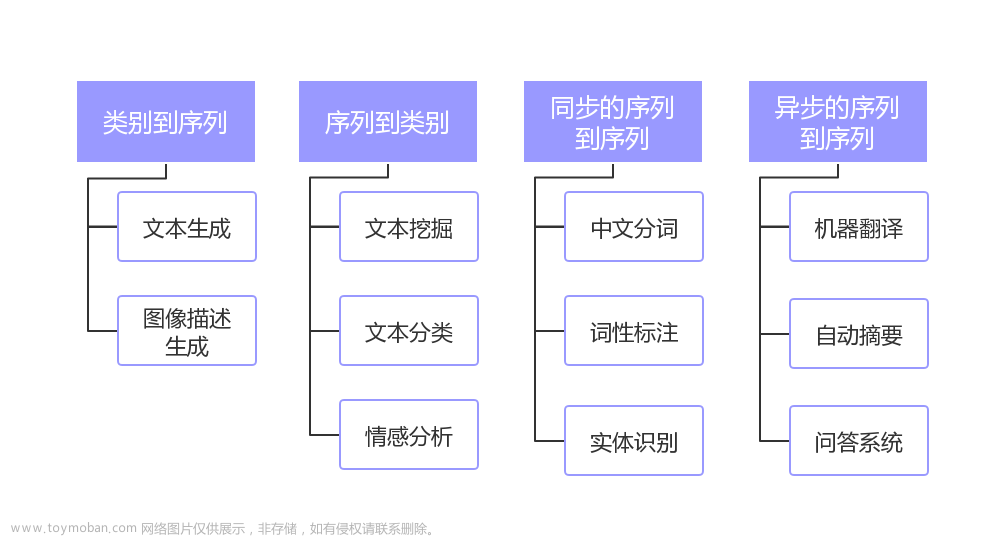
![[自然语言处理] 自然语言处理库spaCy使用指北](https://imgs.yssmx.com/Uploads/2024/02/611542-1.png)



